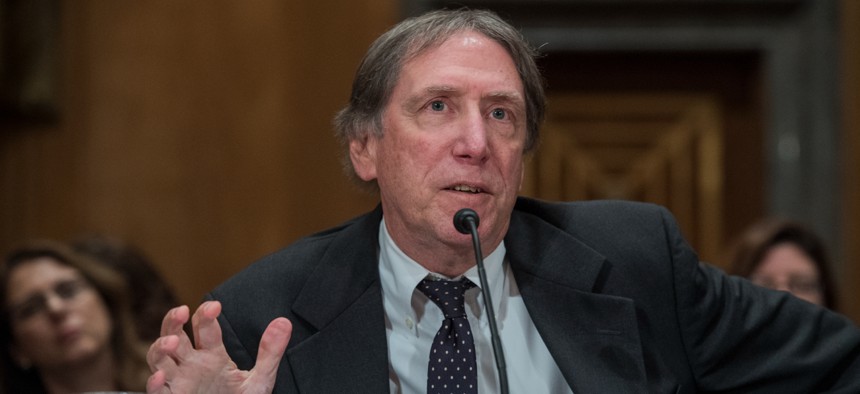
The FLRA is now under the chairmanship of Ernest DuBester, who dissented in the 2018 case. Tom Williams/CQ Roll Call via Getty Images
FLRA Restores Pre-Trump Doctrine on When It Can Intervene in Ongoing Arbitration
A decision by the then-Republican controlled FLRA in 2018 led to a tripling of some cases on the agency’s docket.
The Federal Labor Relations Authority last week rolled back a controversial Trump-era change to how the agency may intercede in ongoing arbitration cases between labor unions and federal agencies, albeit without the support of its lone Republican member.
In 2018, the then-GOP controlled FLRA voted 2-1 to upend 30 years of precedent governing when it can issue so-called “interlocutory decisions”—decisions to weigh in on a labor-management dispute during the arbitration process—in any case where the authority’s decision would effectively end the litigation. Prior to the case, the FLRA only issued such decisions if it found that an arbitrator lacked jurisdiction to hear the dispute “as a matter of law.”
“We do not agree that only exceptions which raise a ‘plausible jurisdictional defect’ present extraordinary circumstances which warrant review,” the FLRA wrote in 2018. “Therefore, we clarify that any exception which advances the ultimate disposition of a case—by obviating the need for further arbitral proceedings--presents an extraordinary circumstance which warrants our review. In other words, we will no longer turn a blind eye to exceptions, which if decided, could obviate the need for further arbitration.”
But in a new decision issued last week, the FLRA, now under the chairmanship of Ernest DuBester, who dissented in the 2018 case, reverted back to the old standard. Citing recent admonishment by federal appeals courts over other precedent changes that departed from “private sector arbitration principles,” the authority found that the more permissive standard for weighing in on an ongoing arbitration case actually made government less efficient and effective, contrary to the Republican members’ claims.
“One of the primary goals of arbitration is ‘settling disputes efficiently,’” the Democratic majority wrote. “If the parties pause the process while the authority considers interlocutory exceptions—which can take time, particularly in complex cases—the interlocutory appeal disrupts the arbitration process . . . This is not a hypothetical concern. In the years following [the 2018 decision], the number of decisions that the authority issued in cases involving interlocutory exceptions nearly tripled.”
In her dissent, FLRA Member Colleen Duffy Kiko, the authority’s lone Republican, disagreed with her colleagues’ claims that the 2018 precedent reduced government efficiency.
“Attempting to justify the changed standard, the majority asserts that interlocutory review disrupts arbitration because some parties choose to pause arbitration while the authority considers interlocutory exceptions,” she wrote. “But as the authority previously explained in [the 2018 decision], this is exactly the efficiency gained by expanding review: when an arbitrator is contractually prohibited from hearing a grievance, the [2018] standard allowed parties to avoid the time and expense of continued arbitration proceedings.”
But Robert Tobias, distinguished practitioner in residence at the Key Executive Leadership Program at American University and a former president of the National Treasury Employees Union, suggested that argument belies a misunderstanding of the purpose of arbitration. During arbitration, the arbitrator is supposed to encourage the parties to reach a settlement and obviate the need for him or her to issue a decision, and expanding interlocutory review encourages parties to avoid negotiation in favor of additional litigation.
“Most arbitrators I’ve ever worked with encouraged the settlement of invoked arbitration—they see that as part of their responsibility to encourage the parties to settle,” Tobias said. “The whole private sector labor law—the Wagner Act—came into existence for the precise purpose of avoiding wildcat strikes and encourage parties to settle as quickly as possible. So anything that delays the development of that relationship and delays decisions is contrary to the notion of supporting collective bargaining.”







